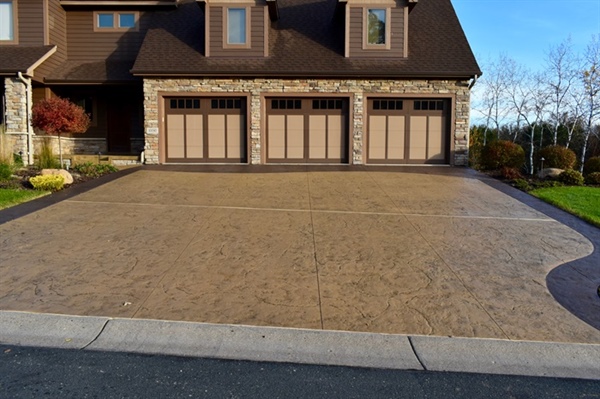How Does Concrete Sealing Prevent Damage and Deterioration?

Concrete is known for its strength, but it can still suffer from cracks, discoloration, and surface wear without proper protection. Exposure to moisture, chemicals, and the elements accelerates deterioration, leading to costly repairs and a diminished appearance. Sealing is essential for extending the lifespan of concrete, enhancing durability, and maintaining its visual appeal.
Our local and trusted team specializes in professional concrete sealing to safeguard your surfaces from environmental stressors. Keep reading to discover how sealing can prevent damage and keep your concrete looking its best.
What Types of Damage Does Unsealed Concrete Face?
Unsealed concrete is highly porous, meaning it absorbs water, oil, and other contaminants that can lead to structural and aesthetic damage. Water infiltration is one of the most significant threats, as it can cause cracking, scaling, and efflorescence—where salts rise to the surface, leaving behind white stains. Over time, water damage weakens the concrete, making it susceptible to erosion and spalling.
Another common issue is staining from oils, grease, and chemicals. Because concrete lacks a protective barrier when unsealed, substances penetrate the surface, leading to permanent discoloration and degradation. In industrial and commercial settings, exposure to harsh chemicals such as de-icers, acids, and solvents can accelerate deterioration, leading to costly repairs.
Additionally, unsealed concrete is prone to surface wear and dusting. As foot traffic and mechanical abrasion wear down the top layer, fine particles break loose, creating a dusty environment. This affects the appearance and contributes to a higher maintenance demand over time.
How Does Sealing Help Protect Against Freeze-Thaw Cycles?
In regions with fluctuating temperatures, the freeze-thaw cycle is a major concern for concrete durability. When water seeps into the pores of unsealed concrete and freezes, it expands, exerting pressure on the surrounding material. As the ice thaws and refreezes repeatedly, it causes cracks, spalling, and surface delamination.
Sealing concrete provides a protective layer that reduces water absorption, preventing freeze-thaw damage. Penetrating sealers, such as silane or siloxane-based products, chemically bond with the concrete, forming a hydrophobic barrier. This allows moisture vapor to escape while keeping liquid water from entering the pores.
By reducing the water content within the concrete, sealers significantly enhance its resistance to freeze-thaw damage, making it a vital preventive measure for outdoor surfaces such as driveways, sidewalks, and parking lots.
Can Sealed Concrete Resist Oil, Chemicals, and Stains?
One key benefit of sealing concrete is its ability to resist stains, oils, and chemicals. When left unprotected, concrete readily absorbs substances, leading to deep-set stains that are difficult or impossible to remove. This is especially problematic for garages, warehouses, and industrial facilities where oil leaks and chemical spills are common.
Film-forming sealers, such as acrylic or polyurethane coatings, create a non-porous surface that repels contaminants. This makes it easier to clean spills before they penetrate the material. These sealers are often used in commercial spaces and high-traffic areas with frequent chemical exposure.
For enhanced chemical resistance, epoxy coatings provide a highly durable and impermeable surface, ideal for industrial settings. Property owners can maintain a clean and stain-free surface for years to come by using the right type of sealer. Epoxy flooring is a popular choice for spaces requiring superior stain resistance.
What’s the Difference Between Penetrating Sealers and Surface Sealers?
Concrete sealers fall into two primary categories: penetrating sealers and surface sealers. Each serves a distinct purpose and is suited to different applications based on the level of protection required.
Penetrating sealers, such as silicates, silanes, and siloxanes, absorb the concrete’s pores and react chemically to create a water-repellent barrier. They do not alter the concrete's appearance and are commonly used for exterior applications where moisture protection is critical. These sealers are ideal for driveways, patios, and sidewalks exposed to the elements.
Surface sealers, on the other hand, form a protective film on top of the concrete. These include acrylic, epoxy, and polyurethane-based sealers, which provide a glossy or matte finish while offering enhanced resistance to stains, wear, and chemicals. Surface sealers are often used in decorative concrete applications and high-traffic areas where aesthetic appeal and durability are priorities.
How Does Sealed Concrete Impact Indoor Air Quality?
Sealed concrete can improve indoor air quality by reducing dust and preventing the absorption of pollutants. Unsealed concrete generates fine dust particles as its surface wears down over time. These airborne particles can contribute to respiratory issues, particularly in enclosed spaces.
Additionally, sealing concrete prevents moisture infiltration, reducing the risk of mold and mildew growth. Unsealed concrete can retain moisture in humid environments, creating an ideal breeding ground for mold spores that negatively affect indoor air quality.
When selecting a sealer, choosing low-VOC (volatile organic compound) products is important to minimize off-gassing. Many modern sealers are formulated to be environmentally friendly while still providing effective protection. Homeowners and businesses concerned about air quality should opt for water-based or low-VOC sealers to maintain a healthier indoor environment.
Protecting Concrete for Long-Term Durability
Sealing concrete is essential in preventing damage and extending the lifespan of surfaces exposed to environmental and chemical stressors. Property owners can make informed decisions about protecting their concrete investments by understanding the different types of sealers and their benefits. Whether it’s guarding against freeze-thaw damage, resisting stains, or improving indoor air quality, applying the right sealer ensures durability and performance over time.
Increase Your Concrete's Durability with Professional Sealing Services
Protect your investment with professional concrete sealing that enhances durability and resists wear. Our team at Artisan Concrete Pro ensures long-lasting protection against moisture, chemicals, and the elements.
Don’t let unsealed concrete lead to costly damage—act now to keep your surfaces strong and looking their best, contact us today.